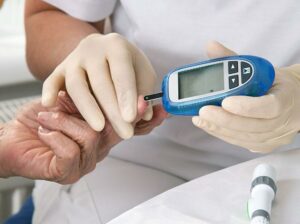The dynamic field of diabetes medications offers a variety of options to help individuals achieve optimal blood sugar control and mitigate the risk of complications. In this comprehensive guide, we will delve into the diverse world of pharmacological management of diabetes mellitus, exploring the various classes of medications, their mechanisms of action, and considerations for personalized treatment plans.
Contents
What Are The Pharmacological Management Of Diabetes Mellitus?
 The pharmacological management of diabetes mellitus involves the use of various medications to control blood sugar levels and prevent complications associated with the condition. It is important to note that treatment plans may vary based on the type of diabetes (Type 1 or Type 2), individual health status, and other factors. Here is an overview of the main classes of medications used in the pharmacological management of diabetes:
The pharmacological management of diabetes mellitus involves the use of various medications to control blood sugar levels and prevent complications associated with the condition. It is important to note that treatment plans may vary based on the type of diabetes (Type 1 or Type 2), individual health status, and other factors. Here is an overview of the main classes of medications used in the pharmacological management of diabetes:
Insulin
- Rapid-Acting Insulin: Examples include insulin lispro, insulin aspart, and insulin glulisine. These insulins start working within 15 minutes, peak within 30 to 90 minutes and have a duration of 3 to 5 hours.
- Short-Acting Insulin: Regular insulin is a short-acting insulin that is typically taken 30 minutes before a meal. It peaks about 2 to 4 hours after injection and lasts for about 5 to 8 hours.
- Intermediate-Acting Insulin: NPH (Neutral Protamine Hagedorn) insulin is an example of intermediate-acting insulin. It has a slower onset and a more prolonged duration of action, typically peaking 4 to 12 hours after injection.
- Long-Acting Insulin: Examples include insulin glargine, insulin detemir, and insulin degludec. Long-acting insulins provide a steady release of insulin over an extended period. It usually covers basal insulin needs for about 24 hours.
Oral Antidiabetic Medications
- Sulfonylureas: Examples include glipizide, glyburide, and glimepiride. They stimulate the pancreas to release more insulin and are often used in Type 2 diabetes.
- Meglitinides: Repaglinide and nateglinide are examples. They work similarly to sulfonylureas but have a shorter duration of action and are taken just before meals.
- Biguanides (Metformin): Metformin is a first-line medication that improves insulin sensitivity, reduces glucose production by the liver, and slows glucose absorption in the intestine.
- Thiazolidinediones (TZDs): Pioglitazone and rosiglitazone are examples. They enhance insulin sensitivity in peripheral tissues, such as muscle and fat cells.
- Dipeptidyl Peptidase-4 (DPP-4) Inhibitors: Sitagliptin, saxagliptin, and linagliptin are examples. They inhibit the breakdown of incretin hormones. This regulates blood sugar by increasing insulin release and reducing glucagon secretion.
Injectable Medications
- Glucagon-Like Peptide-1 (GLP-1) Receptor Agonists: Examples include exenatide, liraglutide, and dulaglutide. They mimic the effects of incretin hormones, promoting insulin release, suppressing glucagon secretion, and slowing gastric emptying.
- Amylin Analogues: Pramlintide is an example. It mimics the hormone amylin, which helps control postprandial glucose levels by slowing down the rate at which glucose is released into the bloodstream after meals.
Combination Therapies
- Many individuals with diabetes require a combination of medications to achieve optimal blood sugar control. Combining medications with different mechanisms of action can have synergistic effects and may include combinations like metformin with a sulfonylurea, DPP-4 inhibitor, or GLP-1 receptor agonist.
Emerging Therapies
- Sodium-Glucose Co-Transporter-2 (SGLT-2) Inhibitors: Examples include empagliflozin, canagliflozin, and dapagliflozin. These medications reduce glucose reabsorption in the kidneys, leading to increased glucose excretion in urine. They also have cardiovascular and renal benefits.
- GLP-1 Receptor Agonists: In addition to injectable GLP-1 agonists, there are now oral formulations available, providing more options for individuals who may prefer oral medications.
Individuals with diabetes should work closely with their healthcare team to determine the most appropriate pharmacological interventions based on their specific circumstances. Regular monitoring, adjustments to medications, and lifestyle modifications remain crucial components of effective diabetes management.
What Are Some Things To Consider?
 When considering the pharmacological management of diabetes mellitus, there are several important factors to take into account to ensure effective and personalized treatment. Here are key considerations:
When considering the pharmacological management of diabetes mellitus, there are several important factors to take into account to ensure effective and personalized treatment. Here are key considerations:
- Type of Diabetes
Treatment approaches may differ between Type 1 and Type 2 diabetes. While individuals with Type 1 diabetes often require insulin therapy, those with Type 2 diabetes may initially start with oral medications and later progress to insulin or other injectable therapies.
- Individualized Treatment Plans
Each person’s response to medications can vary. Healthcare providers consider factors such as age, overall health, lifestyle, and the presence of other medical conditions when developing a treatment plan. Personalization helps optimize glycemic control while minimizing side effects.
- Blood Sugar Monitoring
Regular monitoring of blood sugar levels is essential to assess the effectiveness of medications and adjust treatment plans accordingly. This data helps healthcare providers make informed decisions about medication dosages and timing.
- Adverse Effects and Tolerance
Monitoring for potential adverse effects is crucial. Some medications may cause side effects, and individuals should promptly report any concerning symptoms to their healthcare provider. Tolerance to medications can also vary, necessitating adjustments or changes in the treatment regimen.
- Pregnancy and Special Populations
Management may differ for pregnant individuals with diabetes, as some medications may pose risks during pregnancy. Special considerations are also needed for pediatric and geriatric populations. Healthcare providers should tailor treatment plans accordingly.
- Emerging Therapies and Research
Stay informed about new developments and emerging therapies in diabetes management. Ongoing research may introduce innovative medications or treatment approaches that could benefit individuals with diabetes.
- Regular Follow-Up and Monitoring
Regular follow-up appointments with healthcare providers are essential to assess treatment effectiveness, adjust medications as needed, and address any concerns or changes in health status.
Incorporating these considerations into the pharmacological management of diabetes mellitus ensures a holistic and individualized approach, promoting better outcomes and quality of life for individuals with diabetes.
What Are Some Lifestyle Changes For Diabetes Mellitus?
 Lifestyle changes play a crucial role in the management of diabetes mellitus. Adopting healthy habits can help control blood sugar levels, reduce the risk of complications, and improve overall well-being. Here are some key lifestyle changes for individuals with diabetes mellitus:
Lifestyle changes play a crucial role in the management of diabetes mellitus. Adopting healthy habits can help control blood sugar levels, reduce the risk of complications, and improve overall well-being. Here are some key lifestyle changes for individuals with diabetes mellitus:
Healthy Eating Habits
Adopting a balanced and nutritious diet is fundamental for managing diabetes. This includes incorporating a variety of fruits, vegetables, whole grains, lean proteins, and healthy fats into meals. Portion control is crucial to regulating calorie intake, and paying attention to the type and amount of carbohydrates consumed helps manage blood sugar levels. Limiting the intake of sugary foods and beverages is essential to prevent rapid spikes in blood glucose.
Regular Physical Activity
Regular exercise is a cornerstone of diabetes management. Engaging in aerobic activities like walking, jogging, cycling, or swimming helps improve insulin sensitivity and lowers blood sugar levels. Aim for at least 150 minutes of moderate-intensity exercise per week, complemented by strength training exercises at least twice a week. Consistency is key, so establishing a regular exercise routine and finding activities that bring enjoyment can make it easier to incorporate physical activity into daily life.
Weight Management
Maintaining a healthy weight is crucial for individuals with diabetes. Achieving and sustaining a healthy weight improves insulin sensitivity and contributes to better blood sugar control. Portion control plays a role in weight management, helping prevent overeating. Consulting with a registered dietitian or healthcare provider can provide personalized guidance on nutrition and weight management strategies tailored to individual needs.
Stress Management
Managing stress is important for overall well-being and diabetes control. Incorporating relaxation techniques such as deep breathing, meditation, yoga, or tai chi can help reduce stress levels. Prioritizing self-care and making time for activities that bring relaxation and joy are integral components of stress management. Adequate sleep is also essential, as it contributes to overall physical and mental health.
Regular Monitoring
Regular monitoring of blood sugar levels is a fundamental aspect of diabetes self-management. Checking blood sugar levels as recommended by healthcare providers helps individuals understand how lifestyle changes, medications, and other factors impact their glucose levels. Periodic health checkups with healthcare professionals allow for a comprehensive assessment of overall health and provide an opportunity to make adjustments to the treatment plan if necessary.
Limit Alcohol Consumption
While moderate alcohol consumption may be permissible for some individuals with diabetes, excessive drinking can adversely affect blood sugar levels. Moderation is key, and individuals should be mindful of the potential impact of alcohol on their overall health and diabetes management.
Quit Smoking
Smoking cessation is paramount for individuals with diabetes. Smoking not only contributes to cardiovascular complications but also increases the risk of other diabetes-related complications. Quitting smoking is a crucial step toward improving overall health and reducing the risk of complications. Seeking support from healthcare professionals, smoking cessation programs, or support groups can enhance the likelihood of successfully quitting.
Hydration
 Staying adequately hydrated is essential for overall health, including diabetes management. Drinking water throughout the day helps maintain hydration and supports various bodily functions. Limiting the consumption of sugary beverages is important to avoid unnecessary calories and fluctuations in blood sugar levels. Choosing water, herbal teas, or other low-calorie, non-sweetened drinks promotes hydration without negatively impacting blood glucose.
Staying adequately hydrated is essential for overall health, including diabetes management. Drinking water throughout the day helps maintain hydration and supports various bodily functions. Limiting the consumption of sugary beverages is important to avoid unnecessary calories and fluctuations in blood sugar levels. Choosing water, herbal teas, or other low-calorie, non-sweetened drinks promotes hydration without negatively impacting blood glucose.
Incorporating these lifestyle changes into daily routines can significantly contribute to effective diabetes management and improve the overall quality of life for individuals with diabetes.
Conclusion
In conclusion, pharmacological management of diabetes mellitus involves an approach that combines medication with lifestyle changes. Adopting a balanced and nutritious diet, engaging in regular physical activity, and maintaining a healthy weight are fundamental. Monitoring blood sugar levels, managing stress, and making positive choices like quitting smoking contribute to overall well-being. It’s crucial to work closely with healthcare providers to tailor a personalized treatment plan.
Embracing these lifestyle changes not only helps in controlling blood sugar levels but also enhances the quality of life for individuals living with diabetes, empowering them to lead healthier and more fulfilling lives.
Do you want to get rid of diabetes? Join our online diabetes treatment program and reverse Diabetes naturally through lifestyle changes such as a Personalized Diet plan, Exercise, Yoga, dieticians, and health coaches.

